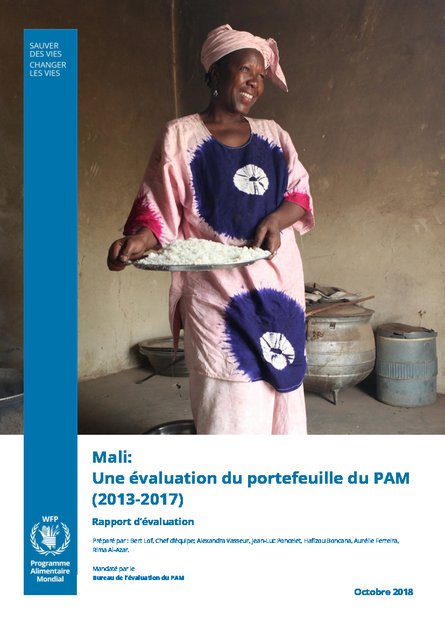
This country portfolio evaluation covered all the WFP operations in Mali for the period 2013 to 2017. It assessed WFP’s alignment and strategic positioning, its strategic decision-making, and the performance of the portfolio as a whole.
The evaluation recognized the complex context of Mali and concluded that the “reactive” response of the country office during the evaluation period was relevant and appropriate, except for some delay in the response to the 2012 emergency. Good working relations with the government and with partners supported the delivery of the programme.
Despite the funding and access challenges, WFP’s overall output was high, with WFP reaching 85% of beneficiaries. This was made possible by a combination of lower levels of assistance by beneficiaries and a reduction in costs, due to an increase in the use of the Global Commodity Management Facility, an increase in local procurement and an increase in the use of Cash Based Transfers.
Funding shortfalls led the country office to prioritize general food assistance in the North over other forms of assistance and risk jeopardizing results achieved in nutrition and school feeding.
The evaluation made eight recommendations for WFP, three of which were partially agreed by management:
- Strengthen analysis of the root causes of needs and re-align programmes and partnerships as needed (agreed)
- Review current geographic targeting of general food assistance with a view to addressing needs in areas beyond the conflict zones of the north and centre (partially agreed)
- Discuss with government and partners how to limit the negative impact on beneficiaries of WFP funding shortfalls in nutrition and school feeding (partially agreed)
- Ensure that the impact of changes in activities and modalities, on the beneficiaries and on the local communities, are analysed in detailed before their implementation and monitored over time (partially agreed)
- Scale-up and strengthen food assistance for assets activities (agreed)
- Prepare and implement an evidence-based operational strategy to integrate gender into programming (agreed)
- Strengthen the feedback mechanism on protection and humanitarian access (agreed)
